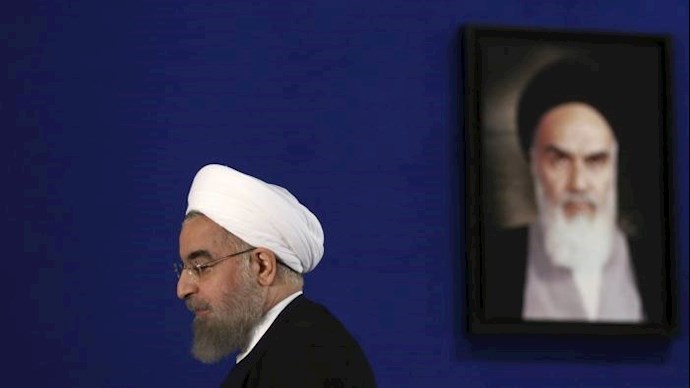Reporting by PMOI/MEK
Iran, June 29, 2020—The remarks made by Iranian regime President Hassan Rouhani on Sunday, June 28, at the COVID-19 Task Force meeting were quite telling, describing 2020 as the toughest year in terms of economic pressure and the novel coronavirus pandemic. Rouhani compared this year with 1981, which he described as the toughest year in terms of security.
The year 1981 marks the beginning of the struggle against the mullahs in which the regime was facing an imminent overthrow. Rouhani said that the state was able to survive thanks to regime founder Ruhollah Khomeini. The Iranian regime President also acknowledged that the 500,000-strong demonstration in Tehran on June 20, 1981, organized by the Iranian opposition People’s Mojahedin Organization of Iran (PMOI/MEK), was a peaceful protest to which Khomeini responded by ordering the Revolutionary Guards (IRGC), his personal army, to open fire on unarmed and peaceful protesters. Hereby Khomeini lost his political legitimacy.
By reminding the events of 1981, Rouhani seeks to portray a stable image of the mullahs’ regime. These days many officials are acknowledging that the aim of the MEK was to “destroy the regime’s future.” Although many events in the past 40 years have temporary relieved the regime, the current chaos and crisis engulfing the mullahs are proof that the regime has no future but being overthrown.
Coronavirus: an “opportunity” becoming a threat
Rouhani’s remarks about coronavirus are also an acknowledgment of the regime’s defeat in this regard. Rouhani and regime Supreme Leader Ali Khamenei attempted to downplay the COVID-19 crisis, but now they are acknowledging that the situation is “red,” and the disease will stay for a long time.
“Every province can offer restrictions and when it is approved it can be implemented within a week. And it can be extended if needed,” Rouhani said, adding that “in the first week of this virus, I said we need to live with this illness for a long time, get adapted, and prepare ourselves… We have not had such an illness in our country’s history. At least not in the past century or so. Such an illness has been unprecedented in our country for the past 140 years or so.”
Also, Deputy Health Ministery Iraj Harirchi said, “The cities of Urmia, Oshnavieh, Bukan, Piranshahr, Takab, Sardasht, Salmas, Mahabad, Miandoab, Naghadeh and Khoy are in code-red conditions and after reopening we are witnessing an increase in the spread of the disease.”
On June 28, Health Ministry spokesperson Simasadat Lari said 144 people had died in one 24-hour period based on the regime’s official coronavirus death toll. This is the highest figure in the past 85 days. Reports from various provinces broadcast by the regime’s state media were until recently considered defamation by critics.
“Twenty percent of the population’s population have contracted COVID-19,” said the Director of the Health & Treatment Network in the city of Borujerd. “There is no cure for this disease, and we are on the verge of more than 50 percent of Iranians contracting the virus… Of these, three to four percent will die, amounting to one or two million Iranians,” he added.
Paving the path to execute November 2019 protesters
In such critical circumstances one realizes why the regime is preparing the grounds to execute arrested protesters of the November 2019 nationwide uprising.
“The convicts filmed their work and sent it abroad. One of them went to Germany, communicated with the MEK and received instructions,” said the regime’s judiciary spokesperson during his June 27 press briefing.
The regime needs to create fear across Iran’s society through executions, particularly targeting those arrested during the November 2019 uprising. However, the mullahs are concerned about the social consequences and attempt to create a political atmosphere for such executions.
In this regard, the Iranian Resistance has country for immediate action by the United Nations Secretary-General, the Human Rights Council and Commissioner, and relevant special rapporteurs, along with international human rights organizations to save the lives of political prisoners in Iran.
Iranian opposition President Maryam Rajavi, head of the National Council of Resistance of Iran (NCRI), has called for an international fact-finding mission to visit Iran’s prisons and meet with the inmates, especially political prisoners.





